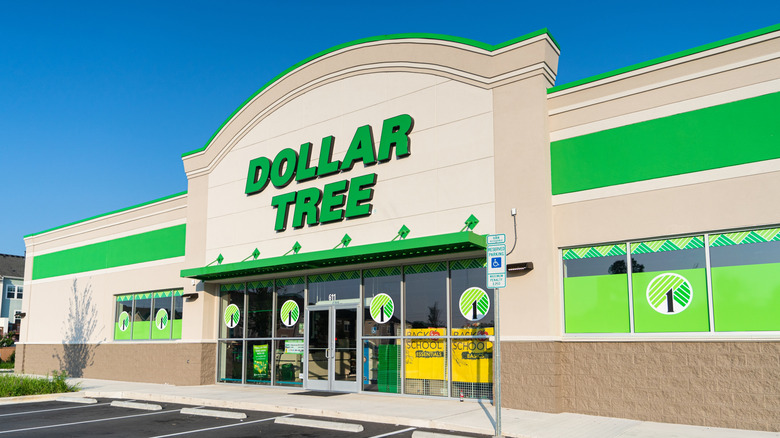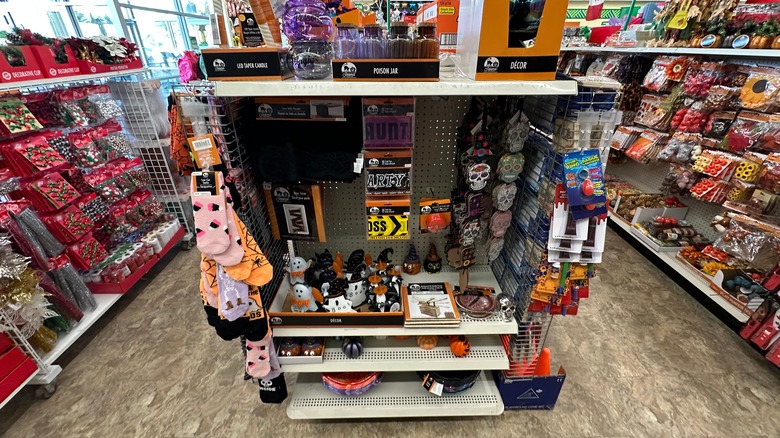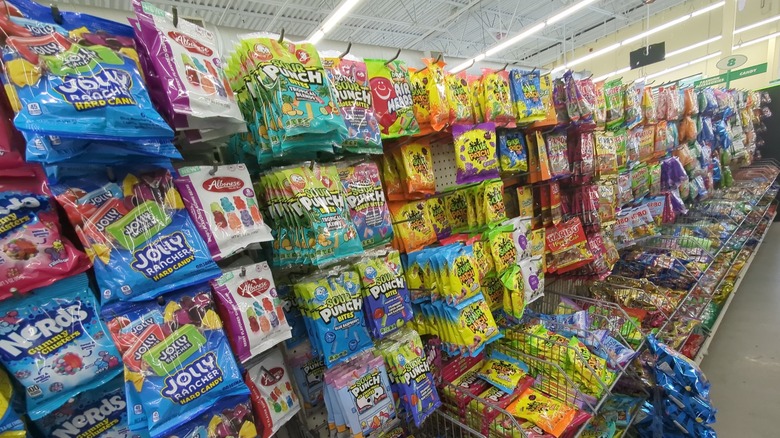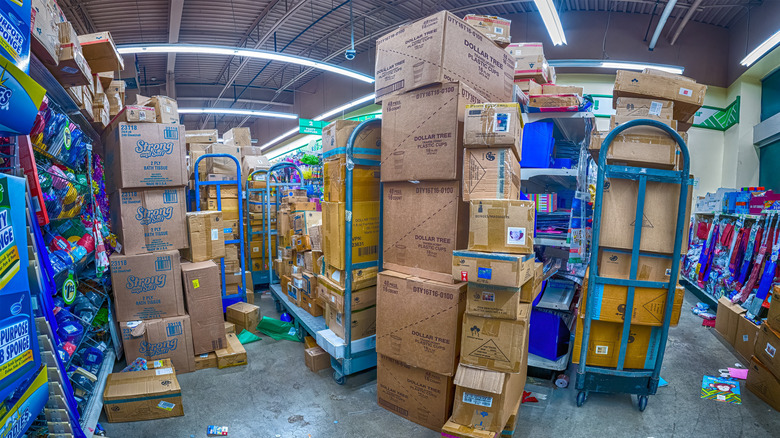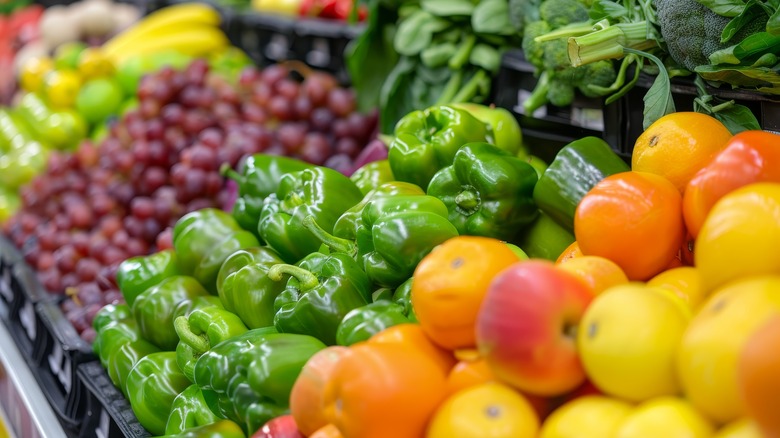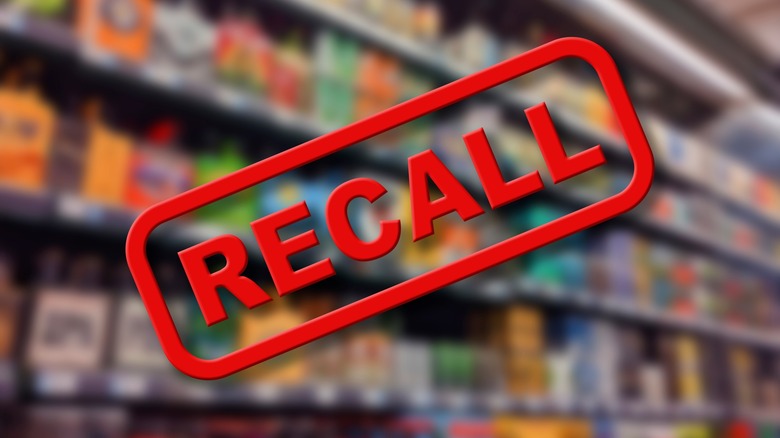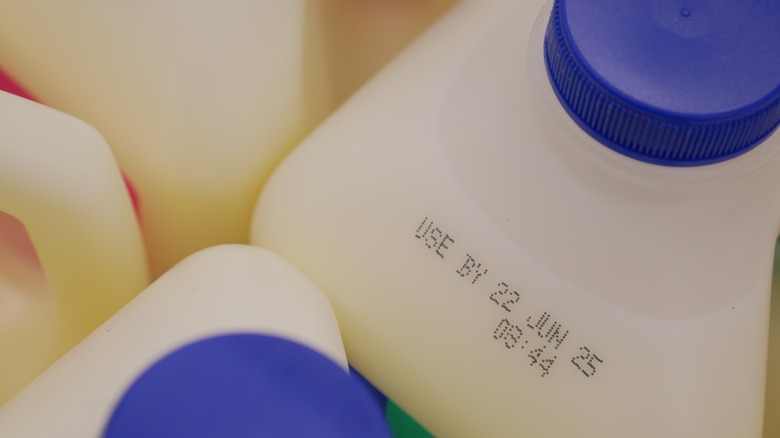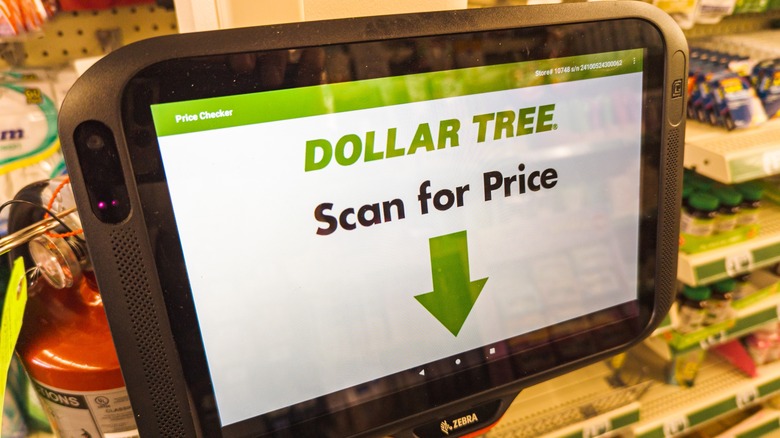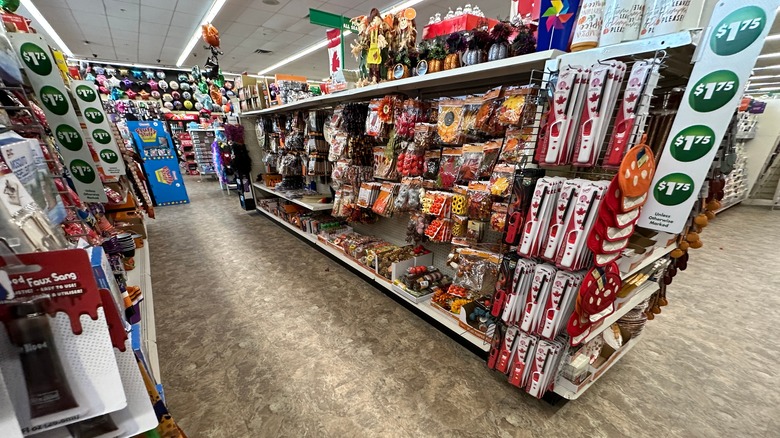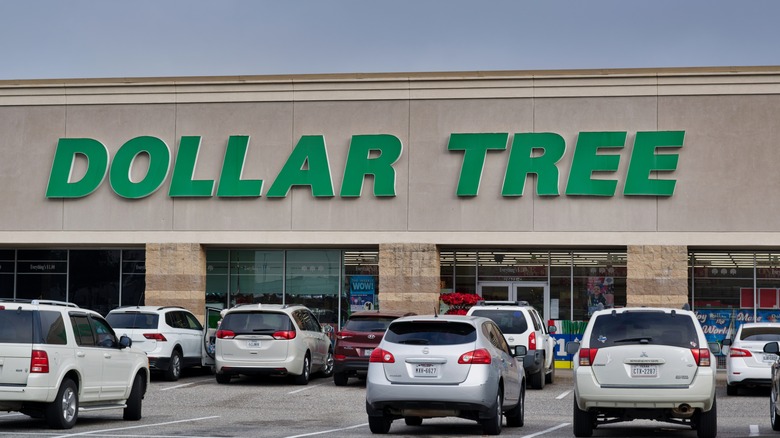Thinking Of Buying Groceries At Dollar Tree? Here's Why You Should Reconsider
Gone are the days when walking out of a store carrying, say, $6 asparagus water said something about your taste, personality, and values. With inflation squeezing wallets practically by the minute, you really can't afford to start virtue-signaling with groceries. Now's the time to ditch the Erewhons and Acmes of the world and make peace with budget shopping at Walmart or Costco.
And if your budget's really putting the string in shoestring, there's always Dollar Tree. With a store count in the tens of thousands, you're not going to have any trouble finding one to shop at. But should you? Sure, it's a great place to snag decorative baskets or gift wrap without torching your wallet. But aesthetic inflation control aside, there are plenty of demerits to shopping at Dollar Tree, especially if you're looking to stock up your pantry. So why shouldn't you make Dollar Tree your go-to for grocery shopping?
You won't have as much brand choice
Dollar Tree might be a great place to pick up storage essentials, but it won't help much in getting your pantry cluttered in the first place. Unlike regular grocery stores, whose Stock Keeping Units (SKUs) range in the tens or even hundreds of thousands, Dollar Tree SKU counts hover around 8,000. That means you're not going to get nearly as much variety as you would shopping anywhere else.
Of course, being frugal with SKUs isn't necessarily a deal-breaker; just ask Costco. But Dollar Tree almost exclusively deals in problem inventory that no other retailers will touch, which means you won't find many of your favorite brands on those shelves. And it's not just that name-brand products are scarce, it's that the brands you do encounter are often suspect. Sure, there are plenty of off-brand products that rival or even outperform big-name items. But you'll rarely encounter those at Dollar Tree. Instead, you might pick up a brand of, say, coffee so obscure it's not even convincingly coffee-flavored. Even if, by some stroke of luck, you stumble across a brand you actually recognize, it's best not to get too attached. Dollar Tree's inventory rotates constantly. That's great if you're a treasure hunter chasing novelty, but not if you're trying to reliably stock up on groceries.
And that's all in fair weather. It gets bleaker. Sometimes you'll walk into a Dollar Tree and get the sense you're walking into a post-apocalyptic wasteland; half-empty shelves, boxes scattered around, and not one staff member in sight. Because Dollar Tree, like most dollar stores, operates on an extremely lean model, staffing is often treated as an optional expense. That means there are rarely enough people on the floor to restock or organize, making stock-outs a near-daily occurrence.
You'll have to put your health goals aside
Dollar Tree's got you covered if all you're in the market for is cheese curls and Gatorade to while away a lazy weekend. But it's the last place you want to go if you're trying to create a balanced meal plan. For one, you won't get much in the way of healthy drink options. Aside from the occasional mini bottle of water, beverage sections are almost exclusively stocked with obscure energy drinks, off-brand sodas, and artificially flavored juices.
Of course, there's an almost endless array of tiny snacks to meet the carbohydrate requirement. You might even come across something you haven't seen since middle school, like Bosco Sticks (yes, they have them). Unfortunately, practically everything you'll pick up will be a high-calorie sodium bomb. Case in point: One Bosco Stick clocks in at about 230 calories and nearly ⅓ of your daily sodium allowance; alarming, considering you need at least five to really savor the nostalgia.
Vegetables, fruit, and meat aren't scarce commodities at Dollar Tree, either. It's just that all of it comes in a can. There's nothing inherently wrong with canned food. Some of it's just as nutritious as fresh, albeit missing the one or two nutrients that fall through during the canning process. That said, tinned food is sometimes teeming with additives, meaning you can easily end up taking in an inordinate amount of sugar, salt, or fat from what seems like a small serving. Chef Boyardee Beef Ravioli, for instance — a Dollar Tree staple for how well it fits the $1-ish cap — is loaded with salt. One serving packs roughly 750 milligrams of sodium, more than ⅓ of your daily allowance.
Sanitation and safety aren't top priorities at Dollar Tree
Grocery stores should at the very least have a clean, well-organized sales floor. Walking into a grocery store and getting assaulted by dirty floors and inventory bedlam is a pretty huge red flag. But that's exactly the scene that'll greet you at almost any Dollar Tree. Inventory toppling over, boxes blocking aisles, grimy floors, and rodents skittering about; all pretty standard fare here.
The chain neglects sanitation so egregiously that it's become a perennial headache for regulators, with nearly 600 stores — almost half its national footprint — attracting citations from Occupational Safety and Health (OSHA) inspectors for noncompliance with safety between 2014 and 2024. And we're not talking run-of-the-mill violations here. In 2025, for instance, a Dollar Tree in North Providence, Rhode Island, was forced to temporarily shutter after inspectors found evidence of severe rodent infestation: droppings, nesting materials, and rat corpses scattered throughout the store — even among shelved inventory. It wasn't the first time the company had come under fire for safety and sanitation issues. Between 2018 and 2020, inspections across Georgia, Alabama, Florida, and Tennessee alone racked up over $1.3 million in fines, contributing to a nationwide total of $9.3 million.
Failing inspections is so routine at Dollar Tree that OSHA has had to enter into multiple corporate-wide settlement agreements over the years just to nudge the company toward basic compliance; all of which seem to go unheeded. In 2020, for instance, Dollar Tree paid $1.35 million in settlement fees to OSHA. Just two years later, inspectors turned up at a Virginia store and uncovered a laundry list of horrors: cracked floors, moldy bathrooms, insect and rodent infestations, and freight dangling perilously above walkways. The situation was so dire that regulators slapped the store with penalties totaling a whopping $400,000; the most significant penalty handed down in the past decade.
The produce likely won't be fresh
Carrying fresh produce is a pretty huge deal for most grocery stores, with most going as far as lacing their produce sections with enough mist to impair visibility; all in the name of creating the illusion of freshness. Not Dollar Tree, though.
It's not that the chain doesn't realize stocking fresh produce is a requisite for any grocery store worth its name. Advocates have been campaigning for fresh vegetables and fruit at these stores ever since their proliferation made them the only food access option for many low-income communities. But Dollar Tree really can't afford to stock fruit and vegetables. For one, Dollar Trees typically sit on tight real estate, with selling square footage hovering between 8,000 and 10,000. That kind of space might keep overhead at a minimum, but it can't support the kind of refrigeration capacity needed for fresh produce. And even if, by some off chance, it could squeeze in a produce section, it'd likely be a financial liability. To keep price points low, Dollar Tree centers its business model around non-perishables. Dry goods can linger on shelves almost indefinitely, which makes them less susceptible to shrink, less demanding of manpower for inventory management, and, therefore, ideal for a business that operates on razor-thin margins.
Only recently did the chain even begin to consider produce as a possible retail avenue. But though there have been pilots at a few stores across the country, Dollar Tree has yet to roll out produce chain-wide, meaning you'll have to hunt for a store that actually carries it. And even if you do manage to locate a unicorn store, there's a good chance you won't end up buying the stuff. The kind of produce you're likely to find at these stores is, frankly, pretty depressing: discolored bananas, moldy tomatoes, and one lonely pre-made salad that looks like food poisoning waiting to happen — in essence, a museum of produce red flags.
Recalled products might still be floating around the shelves
Health officials might do all they can to raise awareness on recalled products, but it's really upon retailers to wipe tainted products off the shelves to ensure they never reach unsuspecting consumers. Getting rid of a tainted product is pretty much a no-brainer for traditional chains like Kroger or Safeway. Inventory management is most likely automated to the point that recalled products can be flagged instantly, and manpower deployed to quarantine and remove items from shelves.
But since Dollar Tree's inventory management is optimized to reduce overhead, there's far less technology and manpower for recall compliance, which means that recalled products can at times linger on the shelves for weeks or months. That's exactly what happened in October 2023, when WanaBana USA recalled an unspecified amount of Apple Cinnamon Fruit Purée pouches after testing revealed elevated lead and chromium. Granted, lead adulteration is pretty common in cinnamon products, but this was 2,000 times the proposed maximum; a number only rivaled by lead-based industrial paint.
Lead exposure has been linked to a host of debilitating health effects, especially in young children, in whom it can cause everything from developmental issues to behavioral problems, and cognitive impairments. Of course, lead contamination of that magnitude spurred a steep illness toll, with over 500 children sickening from consuming the tainted products. But even as the illness count rose, Dollar Tree dragged its feet, with tainted products remaining on store shelves months after the recall notice had been issued. Under FDA query, Dollar Tree officials claimed they'd prohibited sale of the pouches at registers; a pretty lax measure if products are still stacked for anyone to grab. In a warning letter, the FDA decried this approach to compliance, citing an incident where a child had consumed a pouch before purchase. And although the chain pledged to improve its recall compliance following the incident, it's probably wise to check recall registries before committing to a grocery purchase at a Dollar Tree.
You might pick up expired groceries
With some states passing legislation barring businesses from throwing food away, grocery stores have come up with some pretty nifty tricks to deal with expired goods; one of which is liquidating products approaching their expiration dates. These items are typically sold at aggressively discounted rates, ergo goldmines for discount retailers like Dollar Tree.
Dollar Tree's got the store footprint and customer base to offload these products quickly. But it's always a nail-biter between decay and demand; the latter doesn't always come out ahead. Most grocery stores have built-in systems to ensure unsold food doesn't linger past its prime. Not Dollar Tree. Expired goods can sit on shelves almost indefinitely. And according to employees on Reddit, it often takes customers complaining for the store to even realize certain inventory has outlived its shelf life. "I frequently see expired foods and drinks. I've seen moldy cake slices, drinks that have expired months ago, and entire sections of snacks that were past their best buy date. No workers go around checking for expired food, so we usually only discover them when a customer complains," wrote a Redditor claiming to be a Dollar Tree employee.
With such lax inventory control, the odds of buying expired groceries at Dollar Tree are pretty high. A lot of customers have been burned, many of whom take to Reddit to air their frustrations. "I've mistakenly purchased expired items a few times. Lance cream cheese and chives crackers. And a mixed nuts. Both tasted like rancid oil. Now I always check," one Redditor griped.
"I bought a can of Chef Boyardee spaghetti and meatballs. Got home, turned out it's best by date three months ago," another chimed in. Sometimes things spiral so far out of hand that regulators have to step in. The chain's been cited repeatedly for selling outdated items, sometimes having to fork over millions in fines and damages. Rather than overhaul its practices, Dollar Tree seems content to keep cutting checks, as evidenced by the fact that it's been penalized at least three times for selling expired OTC drugs over the past half-decade.
Higher per unit price points
Dollar Tree might have centered its entire brand identity around being a discount retailer, but its price points are anything but discounted. Despite the $1 moniker, the chain — like nearly every other retailer in the country — has padded prices to keep up with inflation, with some items selling well above the promised dollar. There's also the uncomfortable truth that Dollar Tree consistently records gross profit margins in the 30th percentile. For context, discount powerhouses like Walmart and Costco have never pulled off a 30% profit margin. Walmart hovers around 20%, and Costco consistently comes in under 15%.
To be fair, going the Dollar Tree route occasionally pays off, aggressive markups notwithstanding. A 17.6-ounce pack of Caputo potato gnocchi, for instance, goes for about $1 at Dollar Tree, a steal considering the same pack goes for about $2 at Walmart. But the "everything's a dollar" shtick can sometimes be deceptive. Because Dollar Tree sells many of its products in aggressively small sizes, you often end up paying more ounce-for-ounce than you would at a standard retailer. Take water, for example: a six-pack of 8-fluid-ounce Nestlé Pure Life bottles runs you $1.25 at Dollar Tree. Walmart, on the other hand, sells a 35-pack of 16.9-fl-oz bottles of the same water for $5.87, meaning you're paying roughly three times more for each ounce at Dollar Tree.
And then there's the overcharging problem. The chain has some under fire on multiple occasions for charging customers more at checkout than shelf prices. And it's not just Redditors raising hell anymore. Regulators have taken notice, too. In February 2024, for instance, Chicago city officials slapped Dollar Tree with a staggering $162,000 fine for overcharging customers; among a laundry list of other violations.
You might pick up something toxic
Declaring ingredients on product packaging is de rigueur in the food industry, with oversights attracting sanctions or spiraling into massive recalls. But while most retailers steer clear of suppliers who shrug it off, Dollar Tree practically rolls out a welcome mat for them. The chain almost exclusively sources its inventory from dubious overseas suppliers, many of whom don't bother declaring ingredients.
Buying something without an ingredients list is pretty reckless, doubly so if you've got dietary restrictions or allergies. But even when present, the lists can be so vague as to give you absolutely no clue what you're taking in. You might, for instance, pick up a jar of instant coffee whose only listed ingredient is 100% instant coffee. No side note stating where it's from, what additives were used in processing, or even how 100% that claim really is; just 100% instant coffee, full stop.
And when they're not written with all the clarity of a horoscope, ingredient lists can exhaustive to a concerning degree. Products that should ideally contain a single ingredient can somehow end up with about a dozen, most of which have no business being there. One Redditor even discovered a brand of coconut water that inexplicably had half a dozen ingredients, several already on notice for potential health risks. "This brand named Azul Coconut Water (90% Coconut Water) by a brand called Mira of Thailand has 6 ingredients: Young Coconut Water, Water, Sugar, Sodium Carboxymethyl Cellulose, Malic Acid, Sodium Metabisulphite," they wrote.
Now, un-pronounceables like Sodium Carboxymethyl Cellulose are generally considered safe, but not every additive found in Dollar Tree foods meets that mark. A 2021 report by the Campaign for Healthier Solutions tested a chunk of Dollar Tree products and found at least 60% contained toxic chemicals, including BPS, BPA, PFAS, lead, and phthalates. Everything was caught in the mess: canned food linings, cookware, electronics, even children's toys, which just goes to show you how risky buying groceries from Dollar Tree is.
Dollar Tree community impact is largely negative
Most grocery store chains at least pretend to care about community welfare: donating excess food, offering vaccination spaces, hiring locally, or simply paying employees a fair wage, all ripe avenues for giving back. Not Dollar Tree. This one actively degrades local community life. For one, Dollar Tree's rock-bottom pricing pushes out independent grocers, which is disastrous for multiple reasons. With local grocers out of the picture, residents have no choice but to shop at Dollar Tree. That might be a serviceable outcome if Dollar Tree's food matched up in quality, but since shelves are stacked mostly with ultra-processed foods, residents often end up with no real access to fresh or healthy options. It's why neighborhoods are far more likely to turn into food deserts once a Dollar Tree moves in.
Things only get bleaker from there. Once the local grocers shut down, empty storefronts drag down property values, cementing what might've been an up-and-coming neighborhood squarely in the low-rent mire. With the area now undesirable for other businesses, unemployment spikes. Sure, Dollar Tree does employ locals. But its aggressively thin staffing model barely bridges the gap. And even those who land jobs there get shortchanged. The chain has a well-documented history of labor violations — underpayment, overwork, union suppression — all of which make the employment opportunities it does create a net negative.
To top it off, Dollar Tree proliferation ends up dragging down community economies to an almost irreparable extent. As opposed to locally-owned businesses whose profits almost always end up recirculating in the neighborhood economy, Dollar Tree's profits — barring rent, utilities, and salaries — flow out of the communities. And given the chain's tendency to monopolize neighborhood economies, its presence can weaken economies to such an extent that once-thriving neighborhoods end up steeped in poverty.

